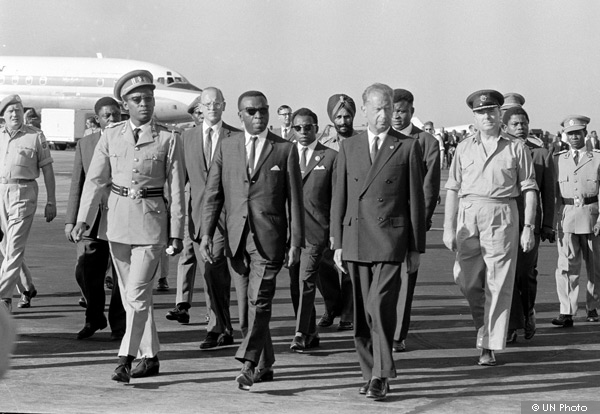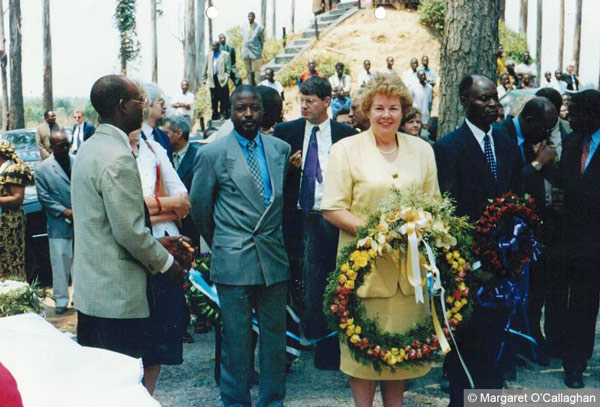 Margaret O’Callaghan, United Nations Population Fund (UNFPA) representative to Zambia from 1998-2005, considers Susan Williams’ new book ‘Who Killed Hammarskjöld? The UN, The Cold War and White Supremacy in Africa’ and her related experiences working for the United Nations in Zambia. Originally published by the Institute of Commonwealth Studies, School of Advanced Study, University of London, in Commonwealth Matters, December 2011.
Margaret O’Callaghan, United Nations Population Fund (UNFPA) representative to Zambia from 1998-2005, considers Susan Williams’ new book ‘Who Killed Hammarskjöld? The UN, The Cold War and White Supremacy in Africa’ and her related experiences working for the United Nations in Zambia. Originally published by the Institute of Commonwealth Studies, School of Advanced Study, University of London, in Commonwealth Matters, December 2011.
Wreath laying events were not something I had anticipated would become part of my professional life but in Zambia it did. One of those occasions was the anniversary of the plane crash in which the Secretary General of the UN died in 1961. Platoons of government officials, diplomats, UN staff and soldiers would dutifully travel north each year from the capital Lusaka to Ndola to solemnly pay homage to his memory.
Reading Williams’ new book Who Killed Dag Hammarskjöld? takes my mind back to those hours of standing beside the giant termite mound, facing the simple and handsome stone monument and watching the tall pine trees surrounding the site bend in the wind. I knew little of the complex drama which lay behind the crash, or my thoughts would not have been as subdued as they were – I would have been seething with anger at the stubbornness, denial, duplicity and complicity of which lay behind it.
Williams is not just raking over old ashes but shining a bright light into the dark recesses of government archives and other sources, and revealing new information which clearly indicates that the crash was no accident. She produces evidence which shows that a number of governments, themselves member organisations of the fledgling UN, along with powerful business interests, played crucial roles in the event. This is perhaps why the book is causing such a stir – despite the half century which has passed.

I wrote and delivered the Ndola speech for the UN in my last year in Zambia, but am now wondering what would I have said differently if I had read this illuminating book beforehand. I had commenced with the words, as an attention catcher, “Peace, perfect peace which passeth all understanding – that is what Hammarskjöld stood for …” Certainly those sentiments still stand, for they could well have been the less poetic but the nethertheless very meaningful words of the Charter – “to take effective collective measures for the prevention and removal of threats to the peace…”. Also relevant to the Congo situation in the Charter was “… respect for the principal of equal rights and self-determination…based on the principle of the sovereign equality of all of its members”. These, after-all, were the reasons why the Secretary General was flying to Ndola.
What I would now add? I would have reminded perhaps, that support for the SG’s highly principled approach in the Congo came from Resolution 161 which was passed because of the newly acquired power of the many nations which had recently achieved self-determination. Countries like India and Egypt, and many smaller ones, were now empowered, making for a significant change in global balance of power.
I would have also reminded that with any such radical change to a power base there is bound to be some backlash, including fear and resistance – and of the need to plan for the prevention or reduction of such responses. Certainly this was the experience of the Congo as international interests, both government and business, fought viciously to keep control over the valuable Katanga resources, to prevent communism from taking over and to maintain a perceived ‘white’ bulwark in Rhodesia and southern Congo against ‘black’ Africa.
I might have reflected on the point that in 1961 the UN family was still developing its capacity to live up to the principles of the Charter and challenged those present to consider how well it was doing fifty years on and what role they were playing in achieving this – and whether the lessons of the Congo experience had been learnt. After-all, Hammarskjöld died for these principles. Thank you Dr Williams for bringing this important story back onto the agenda – it certainly provides strong justification for a new inquiry.